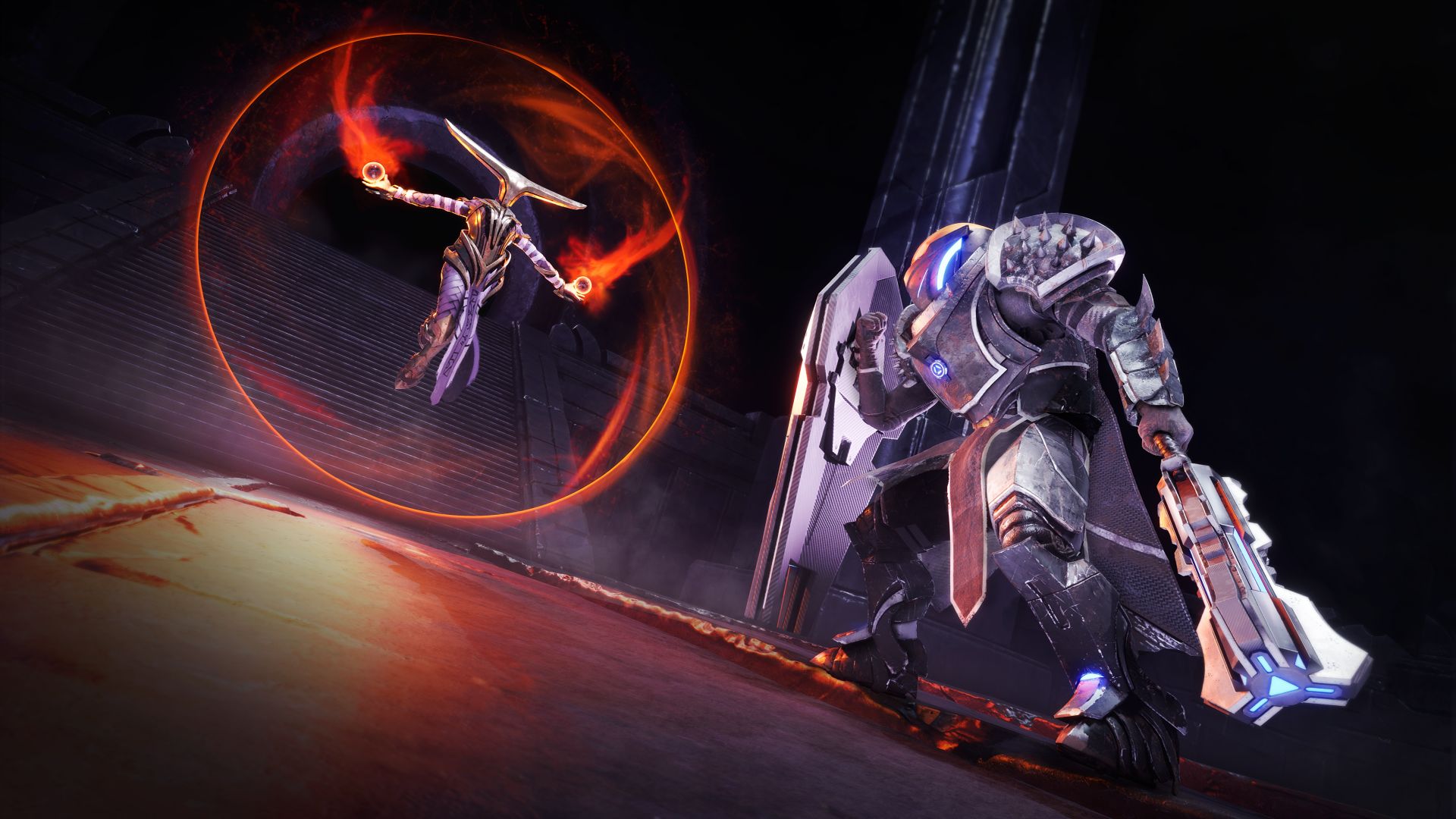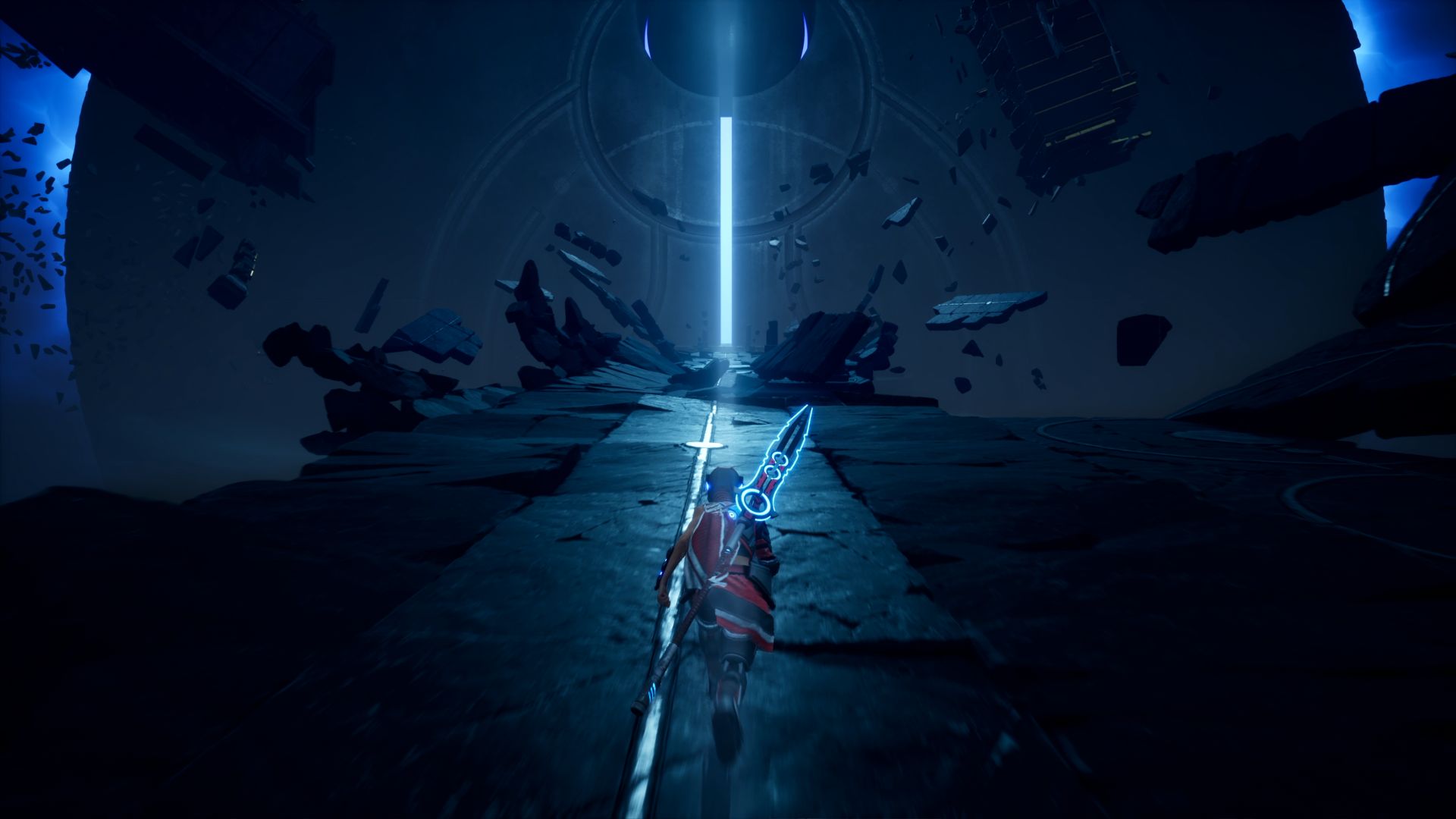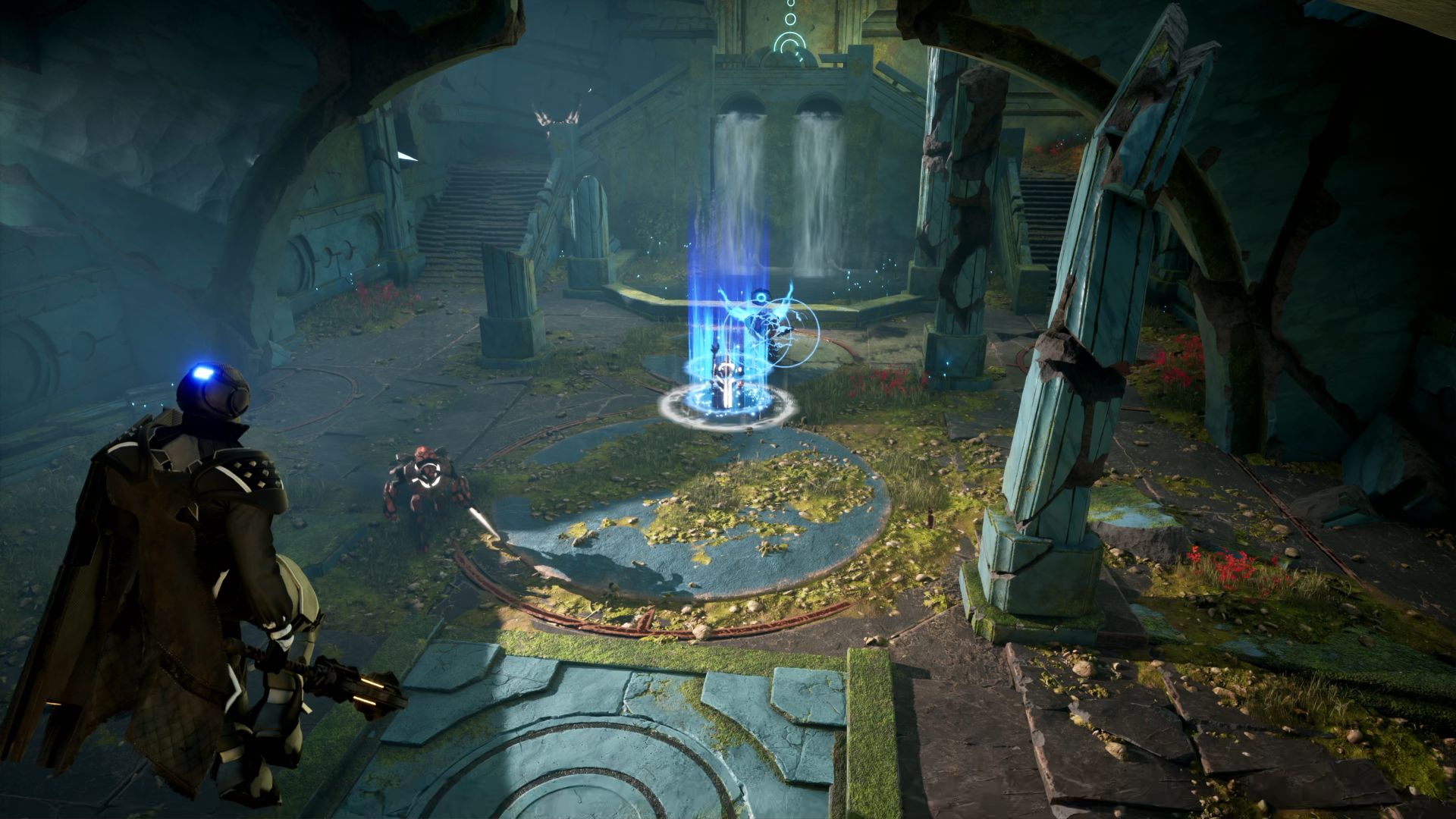We recently announced our debut game, Empyreal, coming to Xbox Series X|S in 2025, and we would like to tell you a little more about the game’s setting and inspirations.
Empyreal is an action RPG in a richly detailed sci-fi fantasy universe. While the setting is sci-fi, featuring futuristic technology and intergalactic civilizations, the feel and mood is more fantasy. And though technology replaces the “magic” from a traditional fantasy setting, the supernatural and the divine play a significant role in the lore and story of this universe.

The game begins with your character arriving on a hitherto unexplored planet, only to discover the remnants of a lost civilisation. What’s more, it soon becomes clear that, though ancient, this civilisation made breakthroughs and discoveries that are far, far removed from humanity’s understanding of the modern world.
Soon, you are confronted with a looming and inscrutable monolith. Why is it here? Who built it? What is it for? And what power does it contain?
Naturally, we won’t be answering those questions for you here and now – these discoveries (and more) are for you to make when you play for yourself. However, what we would like to share are some of the esoteric references that influenced some of the themes in the story, and the relevance they hold even to the modern world.

Embracing a Paradox
While the universe of Empyreal is not directly based on or related to a specific culture or mythology from history, there is one figure that represents an important idea that permeates a core theme of the narrative in the game – the ancient Greek god, Dionysus.
Dionysus is typically portrayed as a drunken party animal in much of modern pop-culture media, but in his seminal work “Dionysus: Myth and Cult”, classical philologist Walter Otto paints a much more complete and complex picture.
While there is truth in Dionysus being the god of wine and the festival, he was also the god of madness and death. Although at first this may seem a perplexing juxtaposition, is there some truth we can learn from it? Otto claims that in “The visage of every true God is a visage of the World”. In other words, even in myth, we invariably find an accurate insight into the nature of the world.

In the case of Dionysus, he represents the paradox of duality. The understanding that life and death, madness and beauty and conflict and creativity are opposites, and yet also pre-requisites for each other. Embracing this paradox is a core philosophy behind Empyreal – to see the universe as both a “Mystic Temple and a Hall of Doom” (an idea introduced by Thomas Carlyle in his text, Characteristics) and to accept this dual nature in its totality. This life-affirming perspective is known as the “Tragic View”.
Empyreal does not feature an encroaching but ill-defined “darkness”, or a “corruption of the land”. Nor does it feature a pantomime villain of inexplicable evil for no other reason than to have an “evil antagonist”. Instead, the story and characters are designed to prompt careful reflection on the nature of humanity, our place in the universe and what it truly takes to guarantee the future of mankind.
Exploring the Human Condition
Now, just because Empyreal does not feature a “big bad” intent on destroying the world for whatever reason, that doesn’t mean the game is without conflict. As before though, the intent is for this conflict to reflect the struggle that life itself invariably presents.

Unsurprisingly, you are not the only one invested in the exploration of this lost civilisation and its achievements. When you arrive on the planet, it is ostensibly to provide a relief effort to a beleaguered expedition that has already been there for two long years, with little progress and innumerable setbacks to show for it.
Each other member of the expedition is an important character with their own personal questlines that you can choose to follow for unique rewards. There are nine of these quests in total, with each questline exploring a different facet of the human condition, based on the ideals of the individual themselves, the challenges they have faced and what they hope to ultimately achieve.
For example, there is an accomplished scientist who, despite their achievements, lives in the shadow of their Great Grandfather, who made technological breakthroughs that transformed modern living. This character has dreamt all their life of making an innovative breakthrough to rival that legacy, and in reverse-engineering the technology of the lost civilisation, that opportunity has seemingly presented itself.

You can choose to assist them in their goals, but it is also possible to set them on a different path by sharing even greater insight into the true divine nature of the cosmos, which then puts the character’s relentless material pursuits into sharp perspective.
There is also a veteran of several wars who is now the Quartermaster of the expedition. Having seen the excesses of humanity in his time, he is pragmatic and optimistic, but acutely appreciates the need to have a firm understanding of one’s own beliefs; a solid foundation on which one is able to face the world. As a result, he will frequently challenge you on your beliefs and play devil’s advocate no matter your response.
Choice and Consequence
These are just a couple of small previews of the characters you will come across in Empyreal. Not only do all nine characters have questlines you can follow, but each one has at least two distinct endings. Quests can play out differently depending on your choices and accomplishments and each ending offers a unique reward. But don’t fret too much about which way to go in a given quest – the game will feature a fully fleshed out New Game+ at launch, so you’ll be able to go back and experiment with different outcomes in subsequent playthroughs.

That’s about all we’ve got time for in this blog. While we have touched on a few of the inspirations and references that influence Empyreal’s themes and narrative, this is far from a comprehensive list, and there’s much more to be uncovered. The game draws heavily on classical and existentialist philosophy, theology and history, with many inspirations not mentioned here that we look forward to players discovering and discussing as they play the game.
Empyreal
Secret Mode
In a far-flung corner of the galaxy an Expedition arrives on a hitherto unexplored planet to find a colossal Monolith built by a lost civilisation. These are no mere ruins: the Monolith is filled with danger, and the Expedition is ill-equipped to unearth the secrets within.
All eyes turn towards an elite mercenary who may succeed where all others have failed.
Venture inside the Monolith and face the automatons that yet remain, remnants of the impossibly ancient civilisation that built this unknowable structure. Survive and uncover revelations that transform our understanding of humanity itself.
Features:
• Stand against formidable foes; your only hope of victory lies in mastering a unique and complex combat system
• A memorable cast of characters, with personal questlines and multiple endings for each one
• A beautiful but shattered ancient world. Explore breathtaking environments filled with hidden details
• Customise your character with a vast array of equipment and collect armour sets that confer powerful bonuses
• Upgrade and modify the loot you find
• Unlock new abilities to personalise your playstyle
The post Philosophy and Duality: Examining the Inspirations Behind the Upcoming Action RPG, Empyreal appeared first on Xbox Wire.
Source: Xbox Blog
—
